
Jose Mourinho, 50, has won more trophies in different countries than anyone else as a superstar coach. It’s no surprise more books on his secrets of success have been published than anyone else. The most recent one, ‘The Manager – Inside the Minds of Football’s Leaders,’ by long time friend Mike Carson (Bloomsbury, August 2013), has a chapter titled ‘Handling Outrageous Talent’ that goes into various less known facets of Mourinho’s stormy personality. The ‘Special One’s’ recent return to Chelsea has raised fans’ expectation big time. And Mourinho usually doesn’t let them down.
For the first time, 30 of the biggest names including legendary coaches Alex Ferguson and Arsene Wenger were interviewed for the book. The book explains their methods, gives examples of lessons they’ve learnt along the way, and describes the decisions they make and the leadership they provided. This book could be any executive’s or a leader’s must-read and execute manual.
Confrontational approach
The Telegraph (UK) published an interview with Mourinho after the release of the book. Here are edited excerpts of his interview;
He explains why he felt the need to adopt a more confrontational approach during his first period in charge at Chelsea in 2004. “I think the Chelsea players at the time needed a leadership to fit their motivation and fit their ambition every day. I cannot be happy by winning two matches, three matches. No – we needed more and more and more. I think that, as a manager, you are always a leader, but sometimes you can be a different kind of leader. There, I was a confrontational leader because I felt that was what the team needed at the time. The guys desperately needed to make the jump from potential to reality, and I think they needed the kind of leader I was.”
He calls his style confrontational leadership. “We were not afraid to say we are the best, we were not afraid to say we are going to win, or we are special, we are going to prove that we are – so it was perfect.” Clearly, Mourinho redefined the role of coach in football by mixing coaching theory with motivational and psychological techniques.
Mourinho was fortunate to be groomed by Sir Bobby Robson, one of the legendry coaches in the 1990s as his assistant coach and interpreter. “One of the most important things I learnt from Bobby Robson is that when you win, you shouldn’t assume you are the team, and when you lose, you shouldn’t think you are rubbish.”
Frank Lampard
Mourinho told Frank Lampard: “You are one of the best players in the world, but nobody knows. In one of the seasons Frank was a finalist in what is now the Ballon d’Or, and I think he didn’t win because he was not a European champion. If Frank’s 2012 Champions League win had come before, he would have been voted the best.”
To him, 2004 and 2008 were really the best years of football. “It was a brilliant phase. I learnt so much with them, and I think they learnt a lot with me too. My big learning was the main idea of motivating the group [through confrontation].”
Managing older players
One of Mourinho’s biggest leadership secret is effectively managing older players. “Older players must not feel that you are there to end their careers. They must feel they have a lot to give until the last moment they are there. Then, probably the last period of their career will give them what the best years of their career didn’t give to them. You have to understand everything about them: frustrations, ambitions, doubts. You have to understand a lot and work with them.”
On how to handle talent
Mourinho has managed some of the game’s biggest talents, from Didier Drogba and John Terry to Cristiano Ronaldo and Zlatan Ibrahimovic. He reveals his approach to handling their sometimes difficult personalities. “I have never had a problem with working with that special talent – never. And I never understood when people say that it is a problem, or you can have a special talent but not two or three or four. I want 11 special talents in my team!
The fact that Mourinho was not much older than the players compared to his contemporaries helped him a lot. “In terms of mentality, I’m not much older than the players – I think I have the ability to put myself at their level.”
“The more you understand them the more you can lead them. I never liked the kind of leadership where the boys say: ‘He’s my leader, I have to respect him.’ I prefer them to say: ‘I respect him and he’s my leader.’ It is a completely different thing. They can say: ‘I do that because he tells me to do that and I have to.’ I prefer them to say: ‘I believe in him so much, and trust him so much that everything he says I want to do!’ I prefer much more this kind of empathy.”
Friends with players
“Many people say we cannot be friends with the players. I say exactly the opposite. If you are not friends with the players you do not reach the maximum potential of that group. You have to be friends with them, but they have to understand that between friends the answer is never the answer they are expecting, or the answer they want to hear. They have to understand that.”
Mourinho not only talks friendship, he lives it. He travelled in the same class as that of the players, unlike most coaches who always flew business class. And in the event of not enough seats in business class for everyone, he preferred to ask players to take the business class and he travelled economy.
On integration of new players in the team, he said: “For any new player arriving, the integration is about getting him to understand we are organized in every aspect and he has to follow us – times, tactics, routines. He has to do it, he has to adapt. We will not change to him – he has to change. So it is about making him feel and understand that he is a special talent, yes – but before him we were a special team, and this team wants to improve and needs him in order to improve.”
Mourinho is happy he got to work in four countries – Spain, Italy, England and Portugal – a rare opportunity for a coach. “The good thing is to have the chance to compare the different emotions and the experiences of different competitions. We can always discuss the qualities of the football in the different countries, but not about the emotions of the game or the atmosphere.”
“The atmosphere, the intensity and the emotion in England is something you cannot compare with other countries and for somebody that is really in love with the game, as I am, this is the place where you enjoy it the most.”











Recent Comments